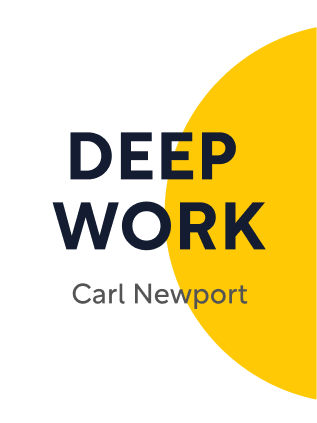

This article is an excerpt from the Shortform book guide to "Deep Work" by Cal Newport. Shortform has the world's best summaries and analyses of books you should be reading.
Like this article? Sign up for a free trial here .
Do you want to know how to avoid distractions and improve your ability to focus? What are the four best techniques?
The ability to avoid distractions and focus is not a simple voluntary action. Focus is a mental muscle and must be trained. If you allow yourself to indulge in distractions often, it will reduce your ability to concentrate.
Continue on for the four best techniques to improve focus and reduce distractions.
Improve Your Ability to Focus
The ability to concentrate is a skill that must be trained. Some people incorrectly think about focus as simply a voluntary action, like flossing—anyone knows how to do it and can do it at any time. In reality, focus is more like a mental muscle and you can’t use it if you don’t train it. The more time you spend in deep work, the better you’ll get at it. You need to know how to avoid distractions and focus.
Conversely, habitually indulging your distractions reduces your ability to concentrate.
- Neurologically, constant attention switching seems to have a lasting negative impact on brain effectiveness. People who switch tasks frequently and get distracted seem to be less able to filter out irrelevancy – they initiate larger parts of their brian that are irrelevant to the task at hand.
- Behaviorally, if every moment of boredom in your life is relieved with reaching for your smartphone, your brain has likely been rewired to be addicted to distraction and novelty. You become hooked on discovering new information, and boredom becomes unbearable. This makes it harder to resist distractions.
If you want to build your deep work ability, you’ll need to learn to focus better.
One mindset suggestion: it’s common for people to see focus as a specialized dedicated period, and distraction as the default. Instead, invert this – focus is your default state, and distraction is a break away from focus.
- For example, some people take an Internet Sabbath (no Internet on Sunday) to avoid distraction for a day. But as an analogy to dieting, this is like eating well one day while eating terribly the rest of the week – you’re still going to gain weight.
Techniques to Avoid Distractions
Below are four techniques you can use to avoid distractions and increase your focus:
1. Schedule Your Internet Time
Schedule in advance when you’ll use the Internet. Avoid it completely outside these times.
Rationale: It’s not just the Internet use that cripples your focus – it’s the frequent switching from low-stimuli to high-stimuli activities that trains your mind never to tolerate boredom. By segregating Internet time, you reduce the number of times you give in to distraction.
- Schedule internet use times explicitly in your schedule.
- Keep a notepad nearby where you record the next time you’re allowed to use the Internet.
- If your Internet time is thirty minutes away, but you have a craving, then resisting the craving will train your muscle to be stronger at resisting. It will get easier and easier to focus for longer periods of time without the itch.
- Plan your work so you don’t need the Internet to make progress. If you get stuck by not being able to access the Internet, then move on to another task. Plan better next time.
- If you do this primarily at work, then don’t stop this practice at home after work. This will undo the training you did at work.
2. Set Deadlines
Set intense deadlines for yourself in which you must concentrate at the limit of your ability to make the deadline.
Rationale: Setting an aggressive deadline will force you to focus. There’s no way you can give in to distraction and still make your deadline.
- Estimate how long you’d normally schedule for the task. Then cut down the time drastically, and set it as your deadline.
3. Practice Productive Meditation
Think about a problem while you do a low-intensity physical activity, like walking or showering.
Rationale: This environment helps problem-solving in two ways: 1) you’re typically away from distractions, and 2) you train your ability to focus on the problem at hand, rather than daydream.
- Preload the problem in your head so you have enough to mull over. Remember what variables to consider, and what the desired output or the important question is. Don’t just go in empty-headed because you won’t have enough content to work with.
- Example: if you’re working on a book chapter, the variables are the main points you want to make in the chapter. You can then work through how you want to flesh out the main points and sequence them in the chapter.
- Like mindfulness meditation, notice when you have lost focus and bring it gently back to the problem. This too trains your mental muscles to focus and resist distraction.
- Beware of “looping” endlessly at a superficial level you understand, without diving deep into areas that you’re not sure about. This is a sign that you’re just doing things that are comfortable for you, not making progress on the really difficult and meaningful parts.
4. Practice Memorization Techniques
Rationale: Cal Newport argues that if you learn to memorize effectively, you train the concentration muscle so that it spills over into the rest of your work. Memory competition champions seem to do well not because of any innate brain capability, but rather because of their memorization technique and their ability to focus.
- For example, if you train yourself to memorize the order of 52 shuffled playing cards, you will develop a level of focus that will improve your focus in work.
- Suggested technique: people memorize images far more easily than an abstract string of characters. Therefore, one memory technique for memorizing a pack of cards is to associate each card with an image, then memorize the images in order. Specifically:
- Picture 5 rooms in a house. Imagine walking through that house.
- Picture 10 objects in each of these rooms, then 2 in the basement. Memorize their location and look as you walk through the house.
- Associate each of the 52 cards with a person or thing. For example, the King of Diamonds might be Donald Trump.
- Associate each of the 52 cards with the 52 objects. For instance, Donald Trump is in the bedroom turning on a lamp. Once you memorize this, you can walk through the house and recall what object is being interacted with by which person.
- When the deck is shuffled, the objects remain in the same order, but the person interacting with each one has changed (it might now be Bill Gates turning on the lamp).
After practicing these focus practices daily for months, you’ll increase your ability to do deep work, and you’ll reach increasing levels of focus intensity.

———End of Preview———
Like what you just read? Read the rest of the world's best book summary and analysis of Cal Newport's "Deep Work" at Shortform .
Here's what you'll find in our full Deep Work summary :
- How deep work is critical for performance and productivity
- Why focus is like a mental muscle
- Why willpower isn't as good as a ritual






